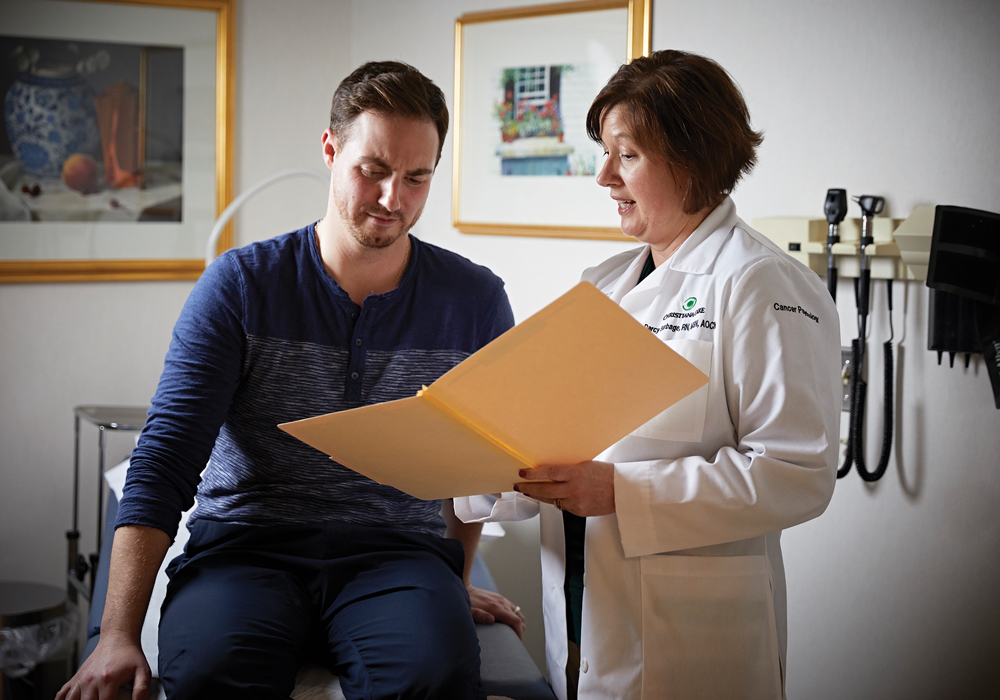The nursing profession has long been an incubator of innovation. Nurses are continually blazing new trails in clinical care, research, and administration, and the landscape is no different in the specialty of oncology. This article provides an overview of three non-traditional roles in oncology nursing: nurse navigation, nursing informatics, and research nursing.
Nurse Navigator Role
The nurse navigator role has its roots in oncology. One of its early pioneers is Darcy L. Burbage, RN, MSN, AOCN®, CBC, who implemented the role of the survivorship nurse navigator in 2010 at the Helen F. Graham Cancer Center and Research Institute. There, she used evidence-based strategies to help patients who had completed cancer treatment but require ongoing nursing care. The concept has since been expanded to other populations and programs throughout the country.
ONS defines an oncology nurse navigator (ONN) as “a professional registered nurse with oncology-specific clinical knowledge who offers individualized assistance to patients, families, and caregivers to help overcome healthcare system barriers. Using the nursing process, an ONN provides education and resources to facilitate informed decision-making and timely access to quality health and psychosocial care throughout all phases of the cancer continuum.”
An ONN must be extremely organized, able to quickly prioritize and reprioritize, communicate effectively, and have knowledge of clinical guidelines, community resources, and organizational metrics.
ONNs are sometimes considered disruptive innovators who act on behalf of patients and their families. They are known for keeping their focus on the patient when the swirl of services and issues gets complicated. ONS has developed and published core competencies for this role.
Nursing Informatics Role
The term “nursing informatics” was first used in 1980 at an international conference of medical records professionals held in Japan. In 1989, leaders of the nursing informatics movement broke away from technology-based definitions to solidify the concept of a combination of nursing, information, and computer science in the administration of nursing care. In 1996, the definition of nursing informatics was broadened to include the discipline of cognitive science. And in 1993, the American Medical Association recognized nursing informatics as a subspecialty of nursing, defined as “a specialty that utilizes information, computer, and nursing science to handle and communicate information, data, and knowledge in the realm of nursing.”
The American Nurses Credentialing Center is one organization that offers national certification in nursing informatics.
The essential tools of nursing informatics in 2017 include the following:
- Electronic health records
- All types of technology devices
- A variety of equipment
- Mobile devices
- Telehealth
- Social media
Nurses who specialize in nursing informatics face challenges such as ensuring that all nurses have computer and technology competencies and preserving the ability of nurses to maintain the “high-touch” qualities of their profession, despite the prevalence of technology in patient care.
Oncology nurses who are interested in developing expertise in nursing informatics should consult the following resources:
- American Nursing Informatics Association
- Health Information and Management Systems Society
- ONS Community
Oncology Research Nursing
The details of this role vary from one institution to another. It is often poorly defined, and its contributions often are underrecognized. Yet oncology research nurses are integral to patient care, the execution of studies and the achievement of patient adherence, and data integrity.
The job title associated with oncology research nursing can also vary among institutions, the most common which include research nurse, research nurse coordinator, research nurse specialist, clinical trial nurse, clinical research nurse, clinical research coordinator, and study coordinator. No matter what the title, oncology research nurses perform similar tasks, including:
- Clinical practice (patient care)
- Study management
- Care coordination and continuity
- Protection of human subjects
- Contributions to science.
Characteristics of a successful oncology research nurse include:
- Attention to detail
- Ability to multitask
- Autonomous thinking
- Advocacy
- Ability to provide effective education
- Critical thinking
- Collaboration
- Desire to be on the cutting edge of practice.
As nursing continues to evolve, it is likely that oncology nurses will have a growing number of roles to pursue. The specialty of oncology itself presents unique challenges, and today’s oncology nurses will continue to keep in step.
Editor’s Note: This article is a summary of a presentation given by Darcy L. Burbage, RN, MSN, AOCN®, CBC, of the Christiana Care Health System; Anne M. Ireland, MSN, RN, AOCN®, CENP, an ambulatory nursing director at City of Hope; and Teresa J. Knoop, MSN, RN, AOCN®, assistant director of clinical operations of clinical trials shared resources at Vanderbilt Ingram Cancer Center, at the 2017 ONS 42nd Annual Congress.






